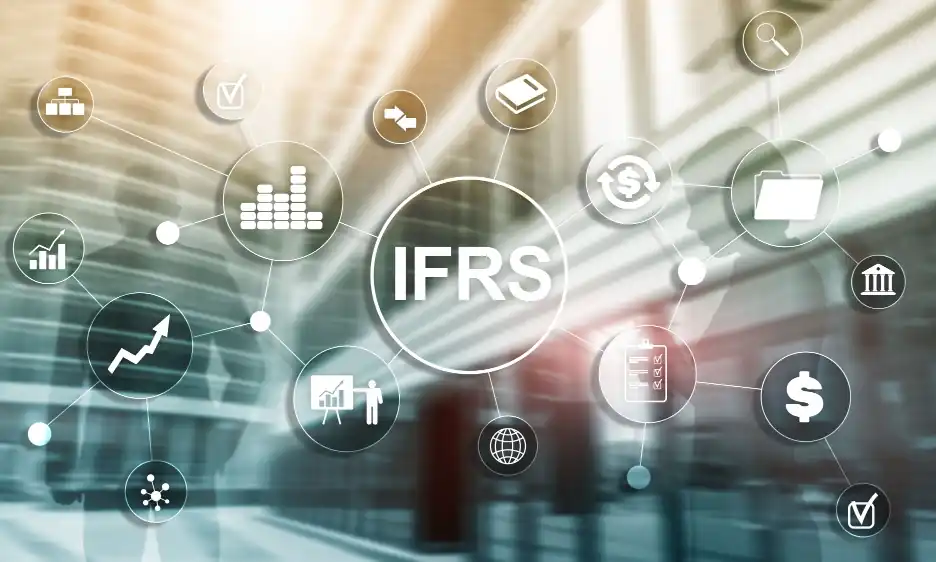Implementing IFRS In India: Opportunities And Considerations
 Share
Share
 Copy Url
Copy Url

Welcome to our discussion on IFRS in India. Let's explore how these standards are changing financial reporting throughout the country. Global commerce is expanding, and so is the need for consistent accounting standards like the International Financial Reporting Standards (IFRS). This raises questions such as "Is IFRS mandatory in India?" and "How do these standards affect corporate reporting, compliance, and accountability?" In India, IFRS isn't required for all sectors. However, it is crucial for improving transparency and the quality of financial statements. The Ministry of Corporate Affairs supports this use.
In this article, we'll cover what IFRS is and why it matters for businesses in India. We'll look at when IFRS started being used in India. We'll also see how IFRS relates to Ind AS (Indian Accounting Standards), and we'll compare these to Indian GAAP (Generally Accepted Accounting Principles). Knowing these differences is important if you're involved in or learning about financial and corporate reporting. We'll point out both the benefits and the challenges of using IFRS in India. By the end, you'll have a clear understanding of how these standards affect India's financial world.

What is IFRS and Why is it Important?
International Financial Reporting Standards (IFRS) are a set of accounting standards for financial reporting. They help companies around the world show their financial results. This clarity lets everyone make better decisions because they can compare companies from different countries. IFRS aims to make financial markets more transparent, accountable, and efficient.
In India, IFRS is key to making the country's accounting standards match those around the world. This makes Indian financial reports clearer and more efficient. The Government of India and the Ministry of Corporate Affairs are working to merge Indian standards with IFRS. This effort helps Indian businesses appeal more to international investors. Yet, not all Indian companies must follow IFRS. Whether they need to depends on how much the company is worth. There are also different rules for companies that are listed or unlisted on any stock exchange in India.
Adopting IFRS can open doors to international markets, make financial reporting more consistent, and improve the comparison of financial statements. However, switching to IFRS can be costly and requires staff training. Despite these challenges, using IFRS in India is viewed positively. It helps meet global accounting standards and boosts India's reputation in international finance.
IFRS isn't required for every company in India. However, for those who qualify and want to compete globally, adopting IFRS is crucial. As India becomes more integrated with the world economy, the importance of IFRS in enhancing reporting, accountability, and compliance in India grows.

IFRS Adoption Timeline in India
The adoption of IFRS in India has been a significant step towards aligning Indian accounting practices with global standards. Here's a brief timeline highlighting the key phases and developments in this process:
Initial Announcement (2010)
The Securities and Exchange Board of India (SEBI) first announced the voluntary adoption of IFRS in India in 2010. This move was intended to begin aligning Indian accounting standards with the globally recognized IFRS to enhance transparency and comparability of financial statements across borders.
Mandatory Implementation Phase I (2016)
The Ministry of Corporate Affairs (MCA) mandated the adoption of Indian Accounting Standards (Ind AS), which are closely aligned with IFRS, starting in April 2016 for certain companies. This included all listed companies and unlisted companies with a net worth of ₹500 crore or more, along with their holding, subsidiary, joint venture, and associate companies.
Mandatory Implementation Phase II (2017)
The next phase began in April 2017, targeting companies whose securities are listed or are in the process of being listed, with a net worth less than ₹ 500 crore, and unlisted companies with a net worth between ₹ 250 crore and ₹ 500 crore, including their related entities.
Broader Applicability (2018 onwards)
By April 2018, the adoption of Ind AS became mandatory for all listed companies in India. This standard applies to both consolidated and stand-alone financial statements, ensuring that companies do not need to maintain dual accounting systems, thereby simplifying compliance and reporting processes.
Special Provisions for the Financial Sector
Notably, certain sectors like insurance, banking, and non-banking financial companies have specific guidelines regarding the adoption of Ind AS. These sectors are generally exempt from applying Ind AS, although if these entities are part of a group covered under the roadmap, they must report Ind AS-adjusted numbers for the group's consolidated accounts.
In conclusion, the phased adoption of IFRS in India through Ind AS has been designed to bring Indian accounting standards up to par with international norms. This initiative by the government of India supports the global accounting framework, aiming to improve the quality of corporate reporting and enhance the comparability and transparency of financial statements across international boundaries. This transition, while challenging, positions Indian companies better on the global stage by making their financial disclosures more globally comparable.

Benefits of IFRS Adoption in India
The adoption of IFRS in India brings several significant benefits to the financial landscape of the country, aligning with global practices and enhancing transparency and reliability in financial reporting. Here are some key benefits:
1. Global Alignment
IFRS in India matches Indian accounting practices with international standards from the International Accounting Standards Board (IASB). This alignment supports global business and investment, creating a shared financial language that improves how companies are compared worldwide.
2. Increased Transparency
Adopting IFRS in India makes financial statements clearer. This clarity is essential for investors and stakeholders because it ensures that financial reports meet global standards. This boosts trust and understanding of financial reports.
3. Attraction of Foreign Investments
With IFRS, Indian companies become more appealing to foreign investors. Investors prefer companies whose financial information is clear and matches that of other countries. This global standard opens up more investment opportunities.
4. Improvement in Financial Reporting
IFRS demands detailed financial information, which enhances the quality of financial data. These standards make sure that company financial statements accurately reflect the company's financial health. This creates confidence among stakeholders.
5. Reduced Cost of Capital
Clear and reliable financial reporting under IFRS can lead to lower costs when borrowing money. Investors feel more secure with lower risks when they trust the financial statements, which means companies can borrow money at lower interest rates.
6. Standardization of Accounting Practices
IFRS helps standardize accounting rules across different countries. This reduces the complexity and costs associated with different accounting systems, especially for companies operating in multiple countries.
7. Enhanced Comparability
With IFRS, financial reports of Indian companies can be compared easily with those from other countries using IFRS. This is useful for investors and companies that want to compare performance globally.
Adopting IFRS in India is crucial for integrating Indian businesses into the global economy. It promotes better economic connections and understanding internationally. This move is expected to make financial reporting in India more transparent, reliable, and comparable, attracting more international investors and improving corporate governance.

Challenges of IFRS Adoption in India
Adopting IFRS in India, though beneficial, presents several challenges that are pivotal to understand, for a smooth transition. Here's a detailed look at these challenges:
1. Lack of Awareness
Many companies, particularly small and medium-sized enterprises (SMEs), are not fully aware of IFRS and its implications. This lack of understanding can hinder effective implementation.
2. High Costs of Transition
Transitioning to IFRS involves substantial costs. Companies need to invest in new accounting software, systems, and training programs to comply with IFRS standards.
3. Regulatory and Legal Hurdles
Adapting the existing legal and regulatory frameworks to accommodate IFRS standards can be time-consuming and complex. This involves modifying some of the existing laws and regulations governing financial reporting and disclosures.
4. Cultural Differences
The unique business practices and cultural aspects of Indian companies can pose challenges in adopting the standardized norms of IFRS, which may not consider local business practices.
5. Training and Skilled Personnel
There is a significant demand for professionals trained in IFRS. The current shortage of such skilled personnel makes it difficult for companies to comply with IFRS requirements effectively.
6. Complexity of Standards
The complexity of IFRS standards can be a barrier, especially for those who are accustomed to the Indian GAAP. The detailed disclosure requirements and fair value measurements are particularly challenging.
7. Integration with Existing Systems
Integrating IFRS with existing accounting systems without disrupting the financial reporting process is a major challenge. This often requires overhauling the existing systems, which is both costly and time-intensive.
8. Differences in Taxation
The alignment of tax reporting with IFRS-compliant financial reporting can create challenges due to differences in tax laws and accounting standards.
9. Reluctance to Change
There is often a natural resistance to change within organizations, which can slow down the adoption process. Convincing stakeholders of the long-term benefits of IFRS amidst short-term disruptions and costs is challenging.
10. Alignment with International Standards
While Ind AS closely aligns with IFRS to ensure consistency with international reporting standards, it includes certain modifications to fit the specific regulatory and economic conditions of India. These necessary adaptations aim to facilitate compliance while respecting local contexts but can sometimes lead to confusion and inconsistencies with the full application of IFRS standards.
Each of these challenges requires careful consideration and strategic planning by both businesses and regulatory authorities in India to ensure a successful transition to IFRS. This transition is not just about compliance but also about leveraging global financial practices to enhance transparency and attract international investment.

Differences Between IFRS and Indian GAAP
Understanding the differences between IFRS and Indian GAAP reveals several key areas where these accounting frameworks diverge. Here's a concise breakdown:
1. Scope and Application
IFRS is widely used internationally in over 110 countries and offers a broader accounting framework. In contrast, Indian GAAP is specifically designed for companies within India, focusing more on compliance with local regulations.
2. Consolidated Financial Statements
Under IFRS, companies might be required to prepare consolidated financial statements unless they meet certain exemption criteria. However, under Indian GAAP, there is no strict requirement for companies to prepare consolidated financial statements unless specifically mandated by regulatory provisions.
3. Disclosure Requirements
Companies operating under IFRS must disclose that their financial statements comply with IFRS. This is not explicitly required under Indian GAAP, where it is presumed that compliance with GAAP shows a true and fair view of the company’s financial condition.
4. Revenue Recognition
IFRS dictates that revenue should be recognized at the fair value of the consideration received or receivable. Indian GAAP, on the other hand, recognizes revenue based on the accrual of sales or the benefits received from using resources.
5. Foreign Currency Transactions
For companies not operating in their functional currency, IFRS requires assets and liabilities to be converted using the exchange rate. This requirement is not present under Indian GAAP, as it primarily applies only within India.
6. First-time Adoption
IFRS provides specific guidelines on how to adopt these standards for the first time through IFRS 1. Indian GAAP lacks detailed instructions on first-time adoption, leaving companies to navigate this transition based on general principles.
7. Use of Fair Value
IFRS has a greater emphasis on the use of fair value for the measurement of various assets and liabilities, whereas Indian GAAP often relies on historical cost, with fewer requirements for fair value measurements except for certain specific cases.
These differences illustrate how IFRS offers a more flexible, principle-based approach compared to the more rule-based, regulatory-focused Indian GAAP. The choice between these standards can affect how a company's financial health is presented and perceived globally. For companies operating both in India and internationally, aligning these accounting practices can be crucial for accurate financial reporting and maintaining investor confidence.

IFRS 18 - What is it and How will it Affect Indian Companies?
IFRS 18, the new accounting standard, is set to impact financial reporting significantly, with particular implications for Indian companies. Here’s an overview of what IFRS 18 involves and its potential effects on businesses in India:
Enhanced Comparability
IFRS 18 introduces a more structured income statement that categorizes income and expenses into operating, investing, and financing activities. This standardization aims to improve the comparability of financial performance across different companies globally, including those in India.
Greater Transparency
The standard mandates detailed disclosures about management-defined performance measures. It requires companies to explain these measures in their financial statements and provide a reconciliation to the most directly comparable IFRS measure. This change is expected to enhance the transparency of financial reporting and create confidence in the minds of investors by making the financial statements comply with globally recognized standards.
Disaggregation of Information
IFRS 18 requires more detailed breakdowns of financial information, both in the financial statements and the notes. This disaggregation will help investors and other stakeholders better understand the financial performance and underlying economic factors of a company. For Indian companies, this means a change in accounting practices that will likely require updates to their accounting systems.
Impact on Revenue Recognition and Financial Statements
The standard also impacts how companies recognize revenue and present their financial statements. It emphasizes the fair value of transactions over historical cost, which could lead to significant changes in the reported financial outcomes for some companies.
Adoption and Compliance
For Indian companies, particularly those with international dealings or those listed on foreign exchanges, adopting these standards will be crucial. They will need to align their financial reporting with IFRS 18 to maintain access to global capital markets and attract foreign investment. This might involve overhauling their current financial reporting and accounting systems to ensure compliance.
Special Considerations for Non-Banking Financial Companies (NBFCs)
Given the significant role NBFCs play in India's financial sector, they will need to carefully assess how IFRS 18's requirements for financial instruments and revenue recognition affect their reporting and regulatory compliance.
Overall, IFRS 18 represents a significant shift towards more uniform and transparent financial reporting, which could benefit Indian companies by enhancing their credibility and comparability on the global stage. However, the transition will require careful planning and adaptation of current accounting practices.

Financial Reporting done right with Report Yak
The introduction of IFRS 18 marks a significant shift in financial reporting standards, impacting Indian companies by mandating more structured and transparent financial disclosures. This new standard aims to enhance comparability and transparency across global financial landscapes, including India, by categorizing income and expenses more clearly and requiring detailed disclosures about management-defined performance measures. These changes will necessitate adjustments in the accounting practices of Indian companies, particularly those with international dealings or those listed on foreign exchanges. The transition, though challenging, is poised to offer clearer insights into financial performances, aiding stakeholders and improving investment decisions.
At Report Yak, India's premier annual report design agency, we understand the importance of staying current with all reporting standards, including the newly implemented IFRS 18. Whether it's financial reports, annual reports, or integrated reports, our team ensures that every document reflects the latest in global and local compliance standards. Check out our Showcase for examples of our LACP award-winning reports, and visit our Services page to see how we can assist you. Don't hesitate to contact us through our form, send a WhatsApp message, call us at 1800 121 5955 (India), or email at contact@reportyak.com for tailored solutions that meet your reporting needs. Our team is ready to help you navigate these changes smoothly and effectively.
Related Posts
-
Integrated Reporting Made Easy For Modern Companies
annual reportAnnual Report design
+6
Dec 31, 2025Share
Copy Url
Simplifying ESG Disclosure for Better Impact
corporate reportingenvironmental and social initiatives
+6
Aug 28, 2025Share
Copy Url
GRI Sustainability Taxonomy: Learn How to Turn Data Into Advantage
corporate governancecorporate reporting
+11
Jul 1, 2025Share
Copy Url


